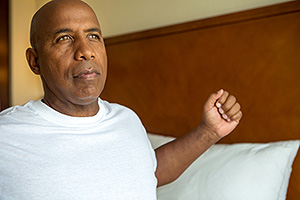Healthwise
Our Health Library information does not replace the advice of a doctor. Please be advised that this information is made available to assist our patients to learn more about their health. Our providers may not see and/or treat all topics found herein.
Topic Contents
Quick Tips: Making the Best of Shift Work
Get started

When you work nights or rotating shifts, taking good care of yourself can be a challenge.
It's common to feel "off," tired, or disconnected from the rest of the world. And that can make it hard to get in a good, healthy routine.
The following tips may help you make some changes. Your doctor may recommend things for you to try. You can choose the ones that you feel ready to try.
- Get good sleep.
It can be tough to get good, restful sleep during the day. Our bodies often prefer to sleep at night. To help your body prepare for sleeping during the day, you can:
- Wear dark glasses on your way home from work. This helps send a message to your body that it's almost time to sleep.
- Avoid caffeine drinks for at least 6 hours before you go to sleep.
- Keep your bedroom quiet, dark, and cool. Use curtains, blinds, or a sleep mask to block out light. Cover clocks in your bedroom with a towel. To block out noise, try earplugs, soothing music, or a "white noise" machine.
- Try to not use technology such as TVs, smartphones, computers, or tablet devices for at least an hour before you go to sleep.
- Do something to relax before you go to bed. You might try a warm shower or bath or maybe some deep breathing or stretching.
- Keep the same sleep and wake times.
This includes the days you don't work.
- Take care of your body.
It may be hard to keep up your regular exercise routine. But you can try to get some extra activity at work.
- Take a walk during your breaks. If you work at a desk, do stretches in front of your computer.
- Use your commute to do some extra walking. Park several blocks away, or get off the bus a few stops early.
- Use the stairs instead of the elevator.
Try to eat meals, at regular times. Eating at set times is important for your body.
Be aware that not getting enough sleep can often make you feel hungry. If you feel hungry:
- Ask yourself: "Am I hungry enough to eat an apple?" If you're not hungry enough for an apple, then your body may not be truly hungry.
- Drink some water. Dehydration can feel like hunger. And that means drinking more water can make you feel less hungry.
Take your medicines safely.
- Changes in your schedule can make it harder to remember to take any prescription medicines you need to take. Try setting an alert on your phone, using a paper calendar, or using a pill box.
- Keep a supply of medicines at work, if you'll need them there.
- Make rotating shifts easier.
If your shift times tend to change a lot, you can:
- Talk to your manager about keeping shift changes to a minimum, if possible.
- Try to have shifts rotate clockwise. For example, it's better to rotate from a day shift, to an evening shift, to a night shift. This is easier for your body to adjust to than random shift changes.
- Stay connected to your loved ones.
It can be hard to miss important events or to have to sleep when everyone else is awake. To help stay connected to the people you love:
- Make a calendar the whole family can see. Include your work hours and your sleep hours. This will help everyone know when they can expect to see you.
- Plan a weekly activity that you can all look forward to. Make a plan to call your kids or your partner on scheduled breaks.
Related Information
Credits
Current as of: October 1, 2025
Author: Ignite Healthwise, LLC Staff
Clinical Review Board
All Ignite Healthwise, LLC education is reviewed by a team that includes physicians, nurses, advanced practitioners, registered dieticians, and other healthcare professionals.
Current as of: October 1, 2025
Author: Ignite Healthwise, LLC Staff
Clinical Review Board
All Ignite Healthwise, LLC education is reviewed by a team that includes physicians, nurses, advanced practitioners, registered dieticians, and other healthcare professionals.
This information does not replace the advice of a doctor. Ignite Healthwise, LLC disclaims any warranty or liability for your use of this information. Your use of this information means that you agree to the Terms of Use and Privacy Policy. Learn how we develop our content.
To learn more about Ignite Healthwise, LLC, visit webmdignite.com.
© 2024-2025 Ignite Healthwise, LLC.



